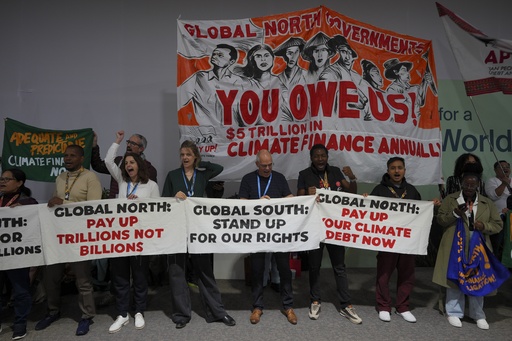
BAKU, Azerbaijan — As the clock ticks down at the United Nations’ annual climate conference, negotiators are grappling with the challenge of securing a financial agreement to aid vulnerable nations with their adaptation and mitigation efforts against climate change. The urgency for a resolution is palpable as COP29, this year’s conference, approaches its conclusion.
COP29 President Mukhtar Babayev urged negotiators to expedite discussions on technical matters by Wednesday afternoon, directing attention to the core issues at stake. Among these challenges is a demand from vulnerable countries, seeking an impressive $1.3 trillion for climate-related damages and adaptation strategies. Experts estimate that a minimum of $1 trillion is necessary, an amount that significantly surpasses current commitments from wealthier nations.
Meanwhile, in Rio, Brazil, where the Group of 20 summit was concluding, the UN Secretary-General emphasized to this assembly of major economies their critical role in determining the success of COP29. He highlighted the necessity for developed countries to substantially increase concessional public funds to meet the diverse financial needs of developing nations.
Brazilian President Luiz Inácio Lula da Silva urged wealthier countries to reconsider their emissions reduction targets, suggesting advancements from a 2050 deadline to as early as 2040 or 2045. He highlighted that the G20 nations contribute to 80% of global greenhouse gas emissions, stressing the importance of collective action, even if progress is made at different rates.
The discussions revolve around several crucial components: the actual financial figures required, the distinction between grants and loans, and the responsibilities of each nation in funding these initiatives. The complexity surrounding these issues makes it particularly challenging for negotiators, with COP29 lead negotiator Yalchin Rafiyev indicating that resolving the size of the financial commitment may depend on agreements reached about the other two factors.
In pressing for decisive outcomes, German climate envoy Jennifer Morgan remarked that leadership is crucial during this stage, urging all nations involved to strive for ambitious climate goals and fully commit to transitioning toward a sustainable future.
Set in 2009, the existing annual goal of $100 billion has seen reluctance from affluent nations to propose new starting figures. Rafiyev indicated that conference leaders are actively urging these nations to deliver a target that reflects both ambition and fairness in meeting global needs.
India’s junior environment minister Kirti Vardhan Singh highlighted that the financial pressures faced by the Global South severely limit their development capabilities, stressing the disproportionate burden of climate change on these countries.
According to analysts, the European Union is expected to present a financial proposal in the range of $200 billion to $300 billion annually, although this is viewed by many advocates as insufficient. Debates around this figure have prompted criticism, with Mercy Corps’ climate policy lead Debbie Hillier calling it “wildly out of step” with the requests of developing countries and a breach of the commitments made during the 2015 Paris Agreement.
Many affluent nations have proposed leveraging loans to maximize funding, which would potentially attract additional investments from various sources. However, poorer nations maintain that they are already overwhelmed by existing debt and advocate for a larger portion of funding to be delivered as grants.
Regardless of the financing structure, Ireland’s environment minister Eamon Ryan emphasized that it would be “unforgivable” for developed countries to disengage from negotiations without a concrete agreement focused on the needs of developing nations. He reinforced the importance of reaching an agreement, stressing the necessity of financial support to ensure these nations are recognized and prioritized in global climate initiatives.
